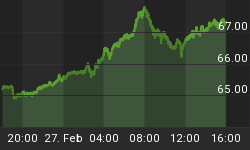As W. Clement Stone once said: "Events tend to recur in cycles." We see evidence of this in nature, in many types of mathematical numbers, and through the business cycle. A number of economists, analysts, and consumers claim that a return to the gold standard, to their "honest money" as they call it, would insulate them from the problems they see in our conventional paper-based currency. Financial leaders dismiss metal-backed currency. A return to gold standard will not occur on their watch. However this debate doesn't matter anymore because these people are getting what they want. Instead of waiting on governments to legislate them their gold-money - the market is providing it for them.
Since the early 1970's when the US separated gold from its currency, experts and citizens have been yearning for a return of the yellow metal to their money. Banking and government agencies insist paper money is the right way forward. Instead of bending to these leadership elites "honest money" folks are finding that The Internet is the perfect place to find like-minded individuals with whom to do business in gold.
Organizations such as e-Gold, Phoenix Dollar, Liberty Dollar, and GoldMoney have sprung up online to offer an easy way for consumers to buy and transfer precious metals. Consumers have responded by giving them their paper money for a chance to transact in gold. Members can purchase gold, silver and other metals at competitive market prices and the organization stores their metal for them offsite. Using an online web interface members can send and receive payments of gold/silver as well as request delivery of their precious metal. The growing gold reserves of these online currencies speak volumes for demand.
e-Gold, for example, claims to have attained a circulation larger than Canada's official gold reserves, web traffic exceeding etrade.com, and processes about $10million of user-to-user payments everyday1. These are certainly impressive numbers - evidence these "honest money" folks really are committed to their ideal. A growing number of merchants who use these new currencies now transact almost exclusively with them. However, the shift to buying and making payments in gold is also gaining ground offline.
The Liberty Dollar is an initiative to put the value of a commodity such as gold & silver back into the pockets of American consumers2. On their website the Liberty Dollar makes a compelling case for moving to a commodity-based currency as it contrasts the growing US Debt with the declining purchasing power of the US Federal Reserve Note. The Liberty Dollar is similar to its counterparts as it allows online payments to be made. However its currency is unique because Liberty Dollar members make day-to-day purchases with gold & silver certificates and medallions. Liberty Dollar merchants claim that the powerful incentive to accept this currency is the unmistakable attractiveness to holding real wealth versus ink and paper. This renaissance of holding gold is not isolated to Americans but also to the directors of central banks.
Russia and China are increasing their country's gold reserves. In 2005 Russia announced it was going to double its gold reserves3. Asian central banks, which hold 2.6 trillion US dollars4, are also being hailed as the next big buyers of gold. China, for instance, attracted international attention as it doubled its gold reserves to 600 tonnes between 2000 and 20025. If this were not enough Chinese economists are now calling for the government to quadruple its gold reserves to 2,500 tonnes6. Why are these countries increasing gold reserves? Why not simply continue to buy the world's great US Dollar?
China has been selling US Dollars noting that "The general trend for the U.S. dollar is continuously weakening".7 As China moves their wealth from dollars to gold it can protect itself from the faltering dollar and take advantage of a rising price of gold. In 2003 the oracle of Omaha, Warren Buffet, put Berkshire Hathaway's assets in a defensive position by purchasing foreign currencies for the first time in its history. He cited the transference of US net worth overseas for the basis of his actions8. The US Dollar's fall from grace means commodities, such as food, are susceptible to price increases. Making matters worse is our changing climate.
Weather changes impact our ability to grow food. As food prices depend on global availability a drop in production has an immediate impact on cost. In early October 2006 US Wheat prices hit a 10 year high because "wheat harvests from Australia to Argentina, Europe and North America have been affected by drought, heatwaves and, in the case of Ukraine, infestation from the Eurygaster beetle."9 In light of this paying for a commodity with a commodity, like gold, will surely make more and more sense.
Many consumers around the world hope their governments respond effectively to the changing climate and the problems facing the world's reserve currency, the US Dollar. Unfortunately ordinary citizens assume they have little political power except every four years. Only through a government mandate, they will claim, can things be made possible. Because a growing number of people across the world recognize that their economic vote can be much more powerful than their electoral vote - gold emerges once again as a currency for all.
1 http://www.e-gold.com/letterdetail.html
2 http://libertydollar.org/
3 http://www.gold.org/value/news/article/5116/
4 http://english.people.com.cn/200512/01/eng20051201_224958.html
5 http://business.timesonline.co.uk/article/0,,13132-2102426,00.html
6 http://www.chinadaily.com.cn/bizchina/2006-05/11/content_587479.htm
7 http://www.washingtonpost.com/wp-dyn/content/article/2006/01/09/AR2006010901042_pf.html
8 http://www.pbs.org/wsw/news/fortunearticle_20031026_03.html
9 http://www.msnbc.msn.com/id/15213604/















